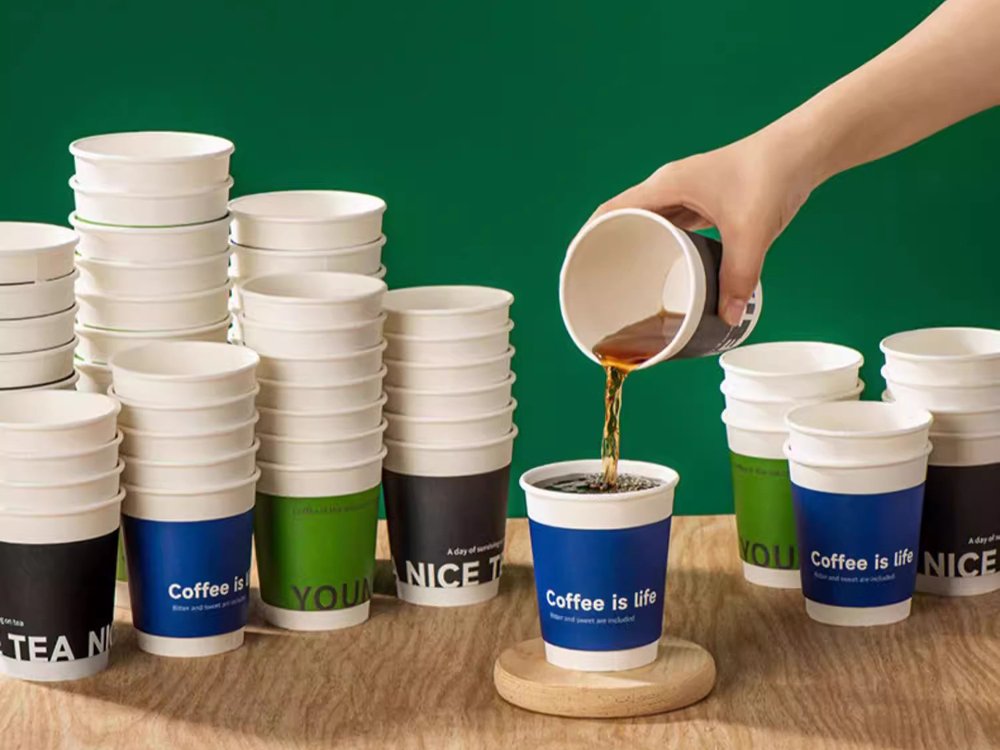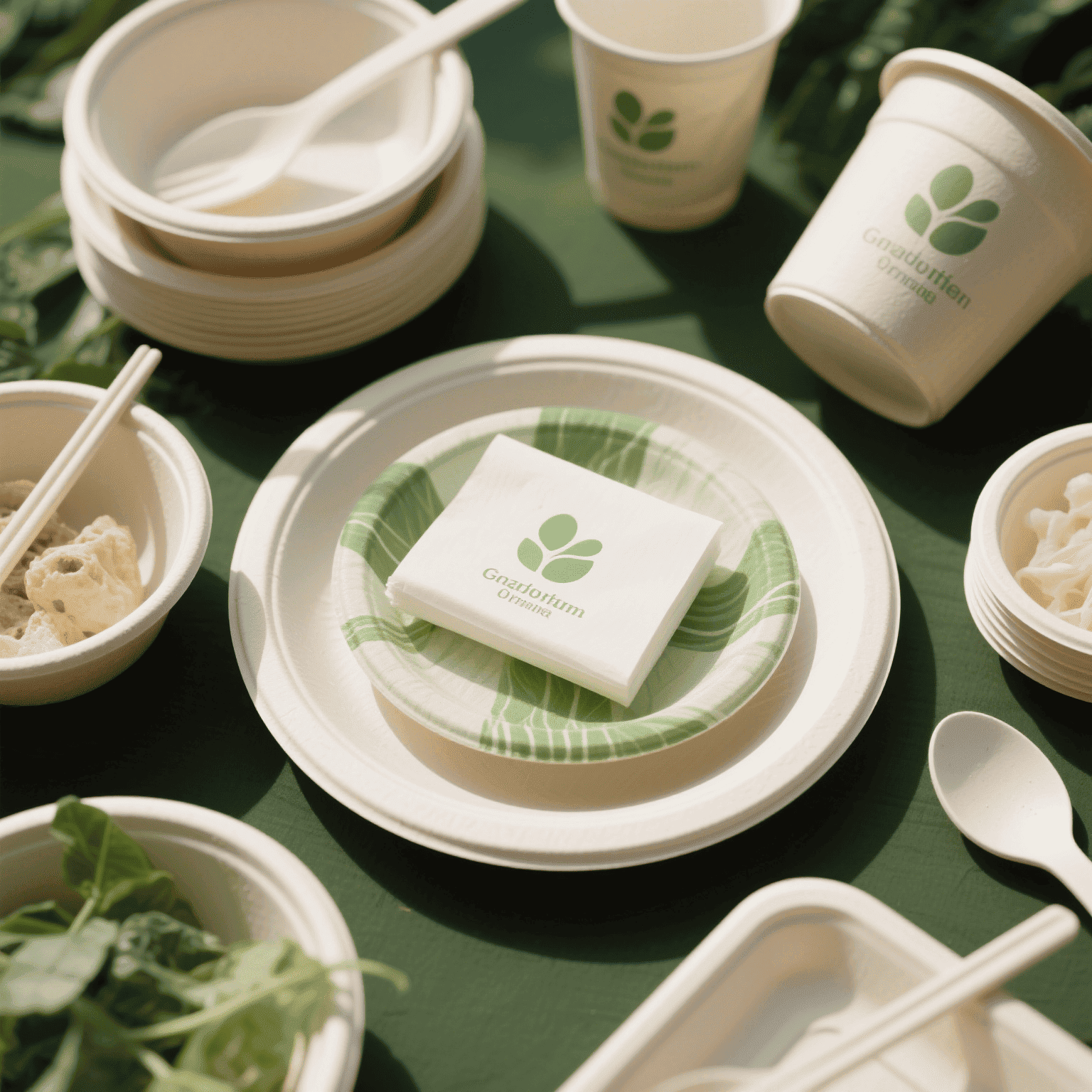Introduction
In today’s increasingly severe environmental crisis, compostable plastic cups are emerging as the ideal alternative to conventional plastic cups. While traditional plastic cups take centuries to degrade – polluting our environment and endangering ecosystems – compostable cups can rapidly break down into harmless compost under specific conditions, effectively solving both plastic pollution and resource waste. With policies like the EU’s “Plastic Ban” and growing consumer environmental awareness, a global packaging revolution is underway. Compostable plastic cups not only reduce carbon footprint by 60% but also enhance corporate image while winning over eco-conscious consumers. This article explores how this green transition achieves both environmental benefits and business value.
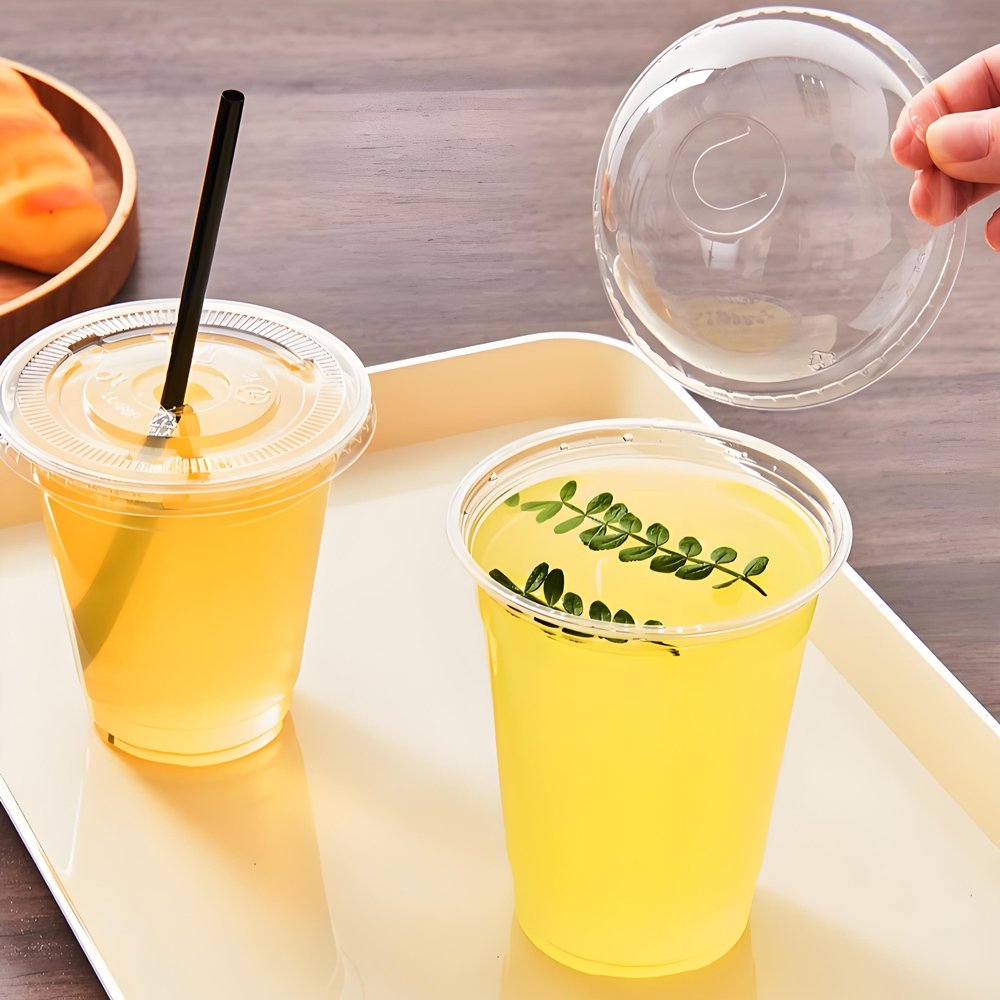
Understanding Compostable Plastic Cups
Compostable plastic cups are made from renewable resources like cornstarch, sugarcane, or other plant-based materials. Unlike conventional plastic cups derived from petroleum, compostable cups are designed to break down into natural elements in a composting environment, leaving no toxic residue.
Key Features:
- Material: Polylactic Acid (PLA), Polyhydroxyalkanoates (PHA), and other bioplastics.
- Decomposition: Breaks down within 90-180 days in industrial composting facilities.
- Certifications: Often certified by organizations like BPI (Biodegradable Products Institute) and meet ASTM D6400 standards.
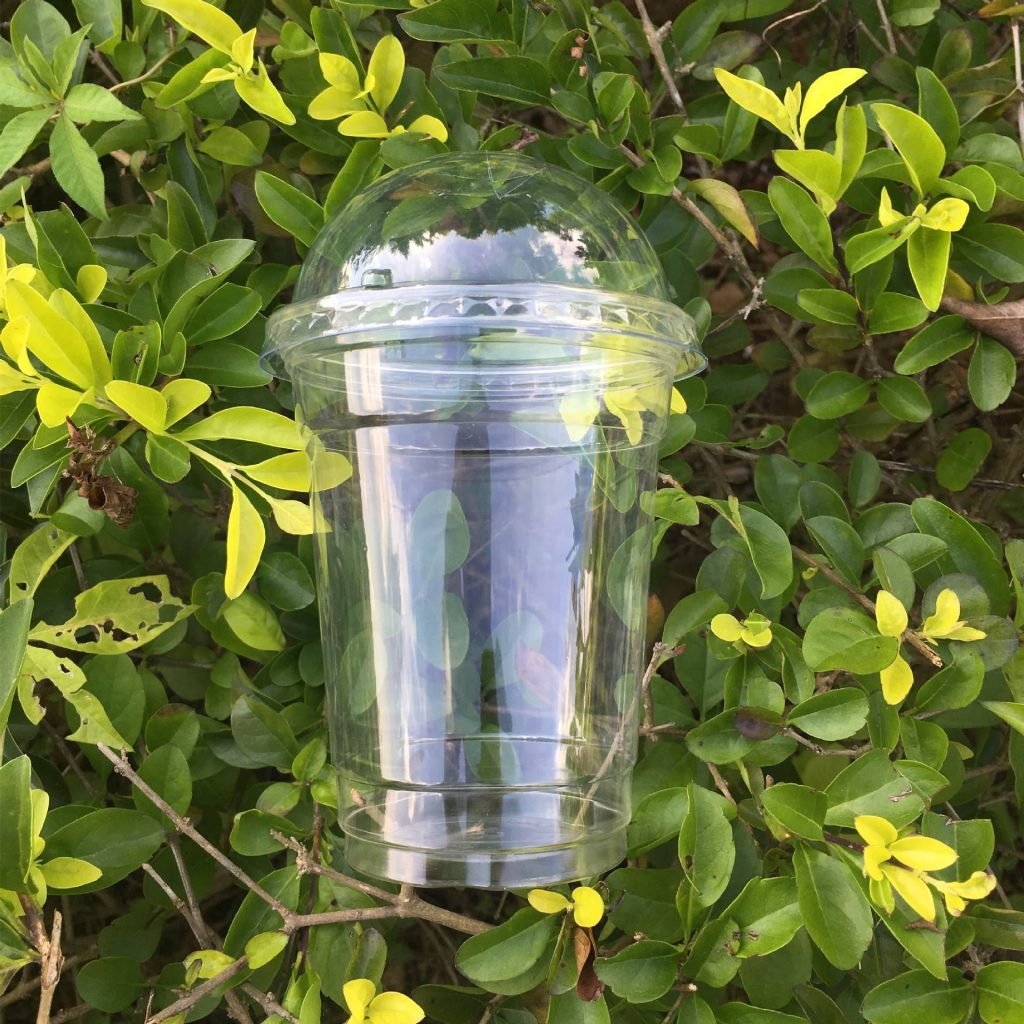
Compostable vs. Traditional Plastic Cups
Material Composition
- Compostable Cups: Made from renewable, plant-based materials (e.g., PLA, PHA).
- Traditional Plastic Cups: Derived from non-renewable petroleum-based resources.
Environmental Impact
- Compostable Cups: Decompose into non-toxic elements, reducing landfill waste.
- Traditional Plastic Cups: Take hundreds of years to decompose, contributing to pollution.
Health Considerations
- Compostable Cups: Free from harmful chemicals like BPA.
- Traditional Plastic Cups: May contain toxic substances that can leach into beverages.
Application Scenarios
- Compostable Cups: Ideal for eco-conscious events, cafes, and businesses aiming for sustainability.
- Traditional Plastic Cups: Commonly used due to low cost but with significant environmental drawbacks.
Comparison Table:
| Feature | Compostable Cups | Traditional Plastic Cups |
|---|---|---|
| Material | Plant-based (PLA, PHA) | Petroleum-based |
| Decomposition Time | 90-180 days (industrial) | Hundreds of years |
| Environmental Impact | Low | High |
| Health Risks | Minimal | Potential chemical leaching |
| Ideal Use Cases | Sustainable events, cafes | General use |
5 Reasons to Switch to Compostable Plastic Cups Today
1. Environmental Sustainability: A Circular Solution
One of the most compelling reasons to switch to compostable plastic cups is their remarkable contribution to environmental sustainability. Unlike petroleum-based plastic cups, which can persist in landfills or oceans for over 400 years, compostable cups made from PLA or PHA break down into water, carbon dioxide, and biomass under the right composting conditions—typically within 90–180 days.
According to the United Nations Environment Programme (UNEP), single-use plastics are a major contributor to global pollution, with over 300 million tons of plastic waste generated annually. Compostable cups help mitigate this crisis by:
- Reducing landfill volume
- Avoiding microplastic pollution
- Supporting zero-waste and circular economy goals
- Converting organic waste into nutrient-rich compost for agriculture
For event organizers, foodservice businesses, and cafés aiming for carbon neutrality, this switch can have a direct and measurable impact on Scope 3 emissions.
2. Health and Safety: Free from Harmful Toxins
Traditional plastic cups often contain hazardous chemicals such as BPA (Bisphenol-A) and phthalates, which can leach into beverages, especially under heat exposure. This raises serious health concerns, particularly for pregnant women and children. These chemicals have been linked to hormonal disruptions, cancer risks, and reproductive issues.
Compostable plastic cups, by contrast, are typically made from food-grade plant-based polymers like PLA. They are:
- BPA-free and PFAS-free (with proper certification)
- Safe for hot and cold drinks (when specified)
- Compliant with international food safety standards like FDA, LFGB, and EU regulations
For businesses in the food and beverage industry, this not only ensures customer safety but also builds trust and enhances brand reputation.
3. Regulatory Compliance: Stay Ahead of Plastic Bans
Governments worldwide are implementing strict regulations to curb plastic waste. From the EU’s Single-Use Plastics Directive to U.S. state-level bans in California, New York, and Washington, non-compliant plastic products are being phased out at a rapid pace.
Switching to certified compostable plastic cups ensures your business:
- Complies with national and international legislation
- Avoids fines, bans, and public backlash
- Prepares early for future legislation (e.g., Extended Producer Responsibility)
Brands that adopt compostable solutions now position themselves as responsible pioneers rather than laggards reacting to legal pressure.
4. Consumer Demand: Green Is the New Loyalty
Modern consumers are no longer just price-sensitive—they are planet-sensitive. A 2023 Nielsen report found that over 73% of global consumers would change their consumption habits to reduce their environmental impact, and 42% of Millennials actively seek out brands with sustainable packaging.
By using compostable plastic cups, businesses can:
- Enhance brand equity and storytelling
- Attract eco-conscious audiences
- Increase customer retention and loyalty
- Improve online reviews and social media mentions (especially for events, cafes, and pop-ups)
In crowded markets, sustainability is no longer just a CSR buzzword—it’s a competitive advantage.
5. Economic Advantages: Long-Term ROI Over Low Upfront Costs
While it’s true that compostable plastic cups may cost more upfront compared to their petroleum-based counterparts, the long-term economic benefits outweigh the initial expense. Here’s how:
- Reduced landfill and waste management costs: Some municipalities charge less for compostable waste.
- Potential tax credits or ESG-related subsidies: In many regions, switching to biodegradable alternatives qualifies for green business incentives.
- Premium pricing opportunities: Eco-brands often charge a premium due to the perceived value of sustainability.
- Lower brand risk and reputation damage mitigation: Public backlash for plastic pollution can cost far more in the long run.
Businesses that adopt bulk compostable cup programs also benefit from economies of scale and customized branding opportunities.
🔍 Expert Insights and Industry Trends
The transition toward compostable plastic cups is not just a fleeting trend—it is a profound shift driven by science, consumer behavior, and regulatory urgency. Industry leaders, sustainability consultants, and environmental researchers agree: bioplastics such as PLA are at the forefront of next-generation packaging solutions.
📊 Global Market Trends
According to a 2024 report by Grand View Research, the global bioplastics packaging market is projected to reach USD 34.2 billion by 2030, growing at a CAGR of 13.1%. This growth is fueled by:
- Corporate ESG commitments from global brands (e.g., Starbucks, Unilever, McDonald’s) pledging to eliminate non-compostable plastics.
- Public policy pressure (e.g., EU Green Deal, US Plastics Pact) enforcing strict packaging waste reduction.
- Consumer pressure demanding zero-waste alternatives in everything from festivals to food delivery.
Compostable plastic cups—especially those made with PLA (polylactic acid)—are becoming standard for eco-conscious businesses across the hospitality, food service, and event sectors.
👤 Expert Commentary
Dr. Helen Raymond, Senior Environmental Analyst at the UK’s Circular Packaging Institute, states:
“Compostable bioplastics are rapidly becoming the material of choice for disposable applications where hygiene is essential and recycling is ineffective. The key is educating businesses on proper disposal infrastructure.”
Tomás Vidal, Chief Sustainability Officer at a leading European food packaging firm, notes:
“PLA-based cups, when sourced and certified properly, solve two issues at once: the demand for convenience and the need for accountability. Brands that adopt compostable packaging early are shaping future consumer expectations.”
🧠 Innovation and Material Science
Material scientists continue to enhance the performance of compostable plastics. The latest generation of PLA and PHA formulations now offer:
- Improved temperature resistance (up to 100°C)
- Higher transparency and rigidity
- Faster degradation under composting conditions
Manufacturers are also exploring home-compostable alternatives and PLA blends with natural fibers, such as bamboo and bagasse, to further improve sustainability and mechanical strength.
🌍 Case Studies: Global Adoption
- In France, national legislation mandates the use of compostable tableware at public events.
- Japan’s Osaka Expo 2025 has committed to using only compostable food containers, including cold cups.
- In California, compostable plastics are being integrated into large-scale school and hospital procurement systems.
Real-World Applications and Feedback
- Bioleader’s PLA Compost Cups: Exported to over 70 countries, praised for their compostability, durability, leak resistance, and cost-effectiveness.
- Event Organizers: Report positive feedback from attendees when using compostable cups, noting enhanced brand perception.
- Cafes and Restaurants: Experience increased customer satisfaction and loyalty by adopting sustainable practices.
Recommended Supplier: Xiamen Bioleader Environmental Technology Co., Ltd.
When considering a switch to compostable plastic cups, Xiamen Bioleader Environmental Technology Co., Ltd. stands out as a leading manufacturer. Specializing in eco-friendly, biodegradable tableware and takeaway food packaging, Bioleader offers a comprehensive range of compostable cups crafted from plant-based materials like PLA (polylactic acid). These cups are designed to decompose fully under industrial composting conditions, significantly reducing environmental impact. Bioleader’s products have earned multiple international certifications, including ISO 9001, FDA-SGS, EN13432, ASTM D6400, OK Compost, BPI, BRC, and NSF, ensuring both safety and environmental compliance. With advanced production facilities and strict quality control measures, Bioleader provides high-quality, sustainable solutions for businesses seeking to minimize their ecological footprint.
Contact Information
Website:www.bioleaderpack.com
Xiamen Bioleader Environmental Protection Technology Co., Ltd
Address: No.39 Xinglong Road, Xiamen, Fujian, China
Contact: Junso Zhang(Mr.)
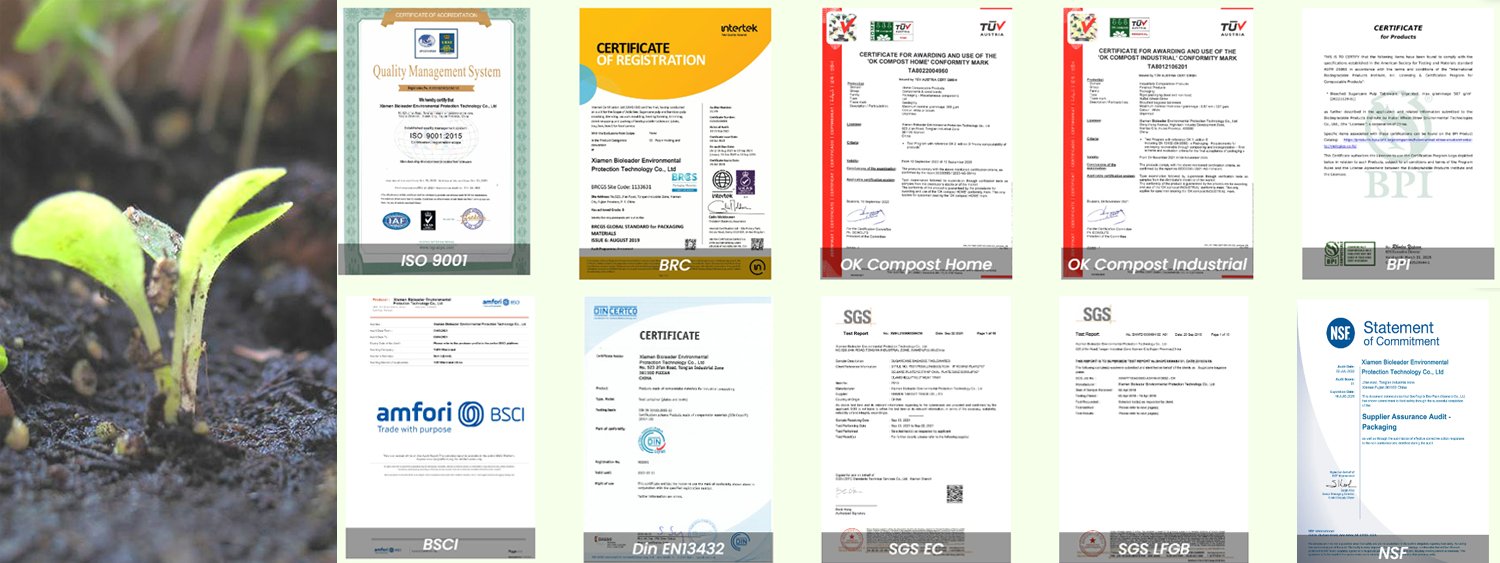
Frequently Asked Questions (FAQ)
- Are compostable cups suitable for hot beverages?
Yes, but ensure they are specifically designed for hot liquids. - Can compostable cups be recycled?
No, they should be composted in appropriate facilities. - Do compostable cups cost more than plastic ones?
Initially, yes, but they can lead to savings in waste management and align with consumer preferences. - How long do compostable cups take to decompose?
Typically 90-180 days in industrial composting environments. - Are compostable cups safe for the environment?
Yes, they break down into non-toxic elements, reducing pollution. - Can I compost these cups at home?
Some are home compostable; check the product specifications. - Do compostable cups have a shelf life?
Yes, they should be used within the recommended period to ensure integrity. - Are there certifications for compostable cups?
Yes, look for certifications like BPI and ASTM D6400. - Can compostable cups be customized with branding?
Yes, many manufacturers offer custom printing options. - What happens if compostable cups end up in landfills?
They may not decompose effectively, potentially leading to methane emissions.
Conclusion
Transitioning to compostable plastic cups is a significant step toward environmental sustainability. These cups offer numerous benefits, including reduced pollution, compliance with regulations, and alignment with consumer preferences for eco-friendly products. By adopting compostable alternatives, businesses can demonstrate their commitment to the environment and appeal to a growing market of environmentally conscious consumers.
References Sources List
- Preetam Basu & Thanos Papadopoulos The disposable cup crisis: what’s the environmental impact of a to-go coffee? https://www.theguardian.com/environment/2024/jan/22/disposable-coffee-cups-environmental-impact
- Sam Shipiti Recyclable Coffee Cups vs Compostable: Which Are Better?https://mtpak.coffee/2023/12/recyclable-coffee-cups-compostable-preferred/
- Maira Kanai-Nasir What is the Environmental Impact of To-Go Coffee Cups?https://mtpak.coffee/2024/06/environmental-impact-of-to-go-coffee-cups/
- Emile Fourie & Phillipe Dewolfs Compostable Coffee Cups: Why Certifications Are Essential https://mtpak.coffee/2024/03/compostable-coffee-cups-certifications/
- MTPak Coffee Understanding the Lifecycle of Compostable Coffee Cups https://mtpak.coffee/2022/08/understanding-the-lifecycle-compostable-coffee-cups/
- MTPak Coffee Eco-Friendly Coffee Cups: Which Is Best for Your Business?https://mtpak.coffee/2024/01/eco-friendly-coffee-cups-for-your-business/
- The Guardian How to Ditch Disposable Cups – and Transform the Way You Enjoy Coffee https://www.theguardian.com/australia-news/commentisfree/2024/apr/27/how-to-ditch-disposable-cups-and-transform-the-way-you-enjoy-coffee

